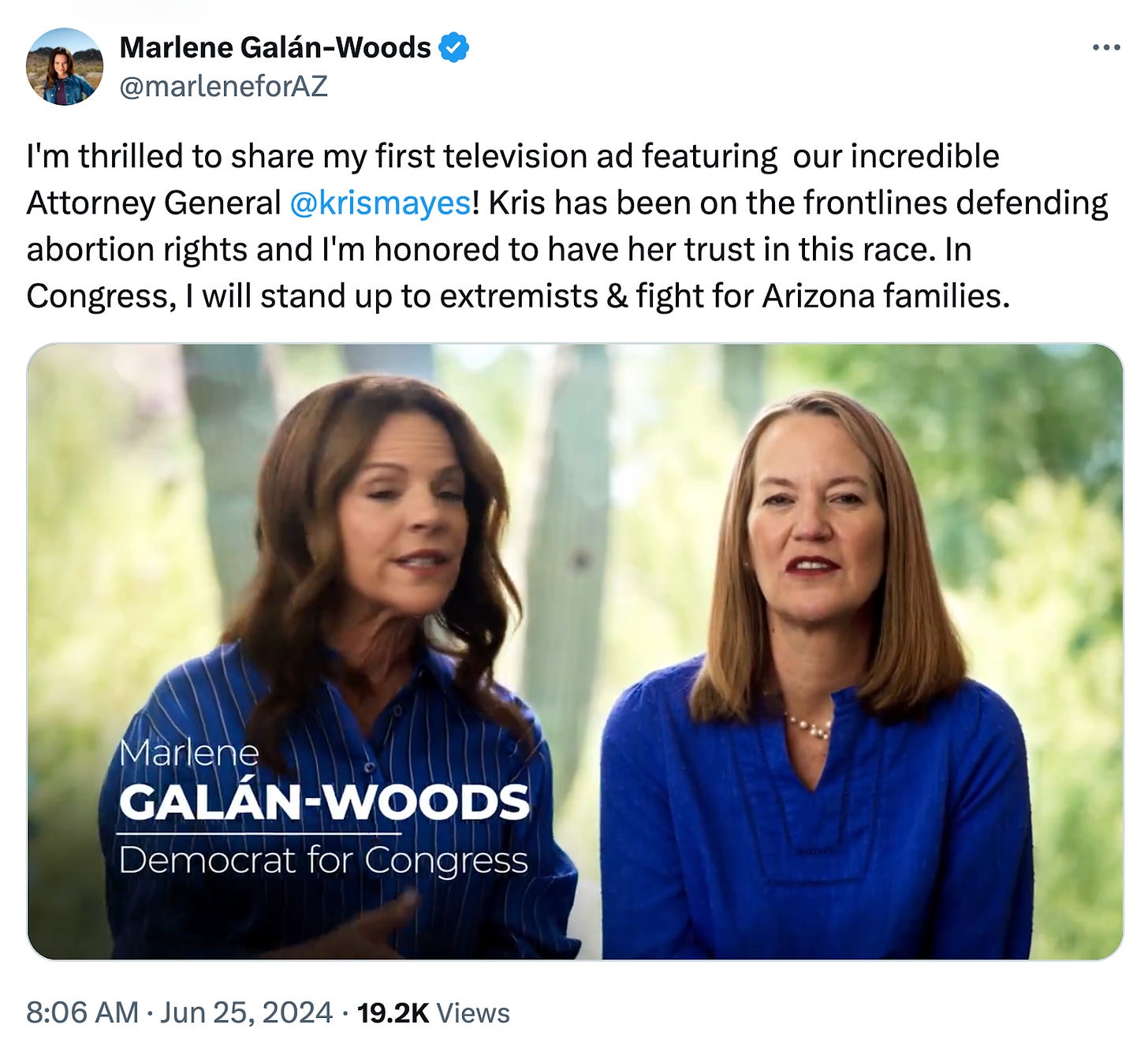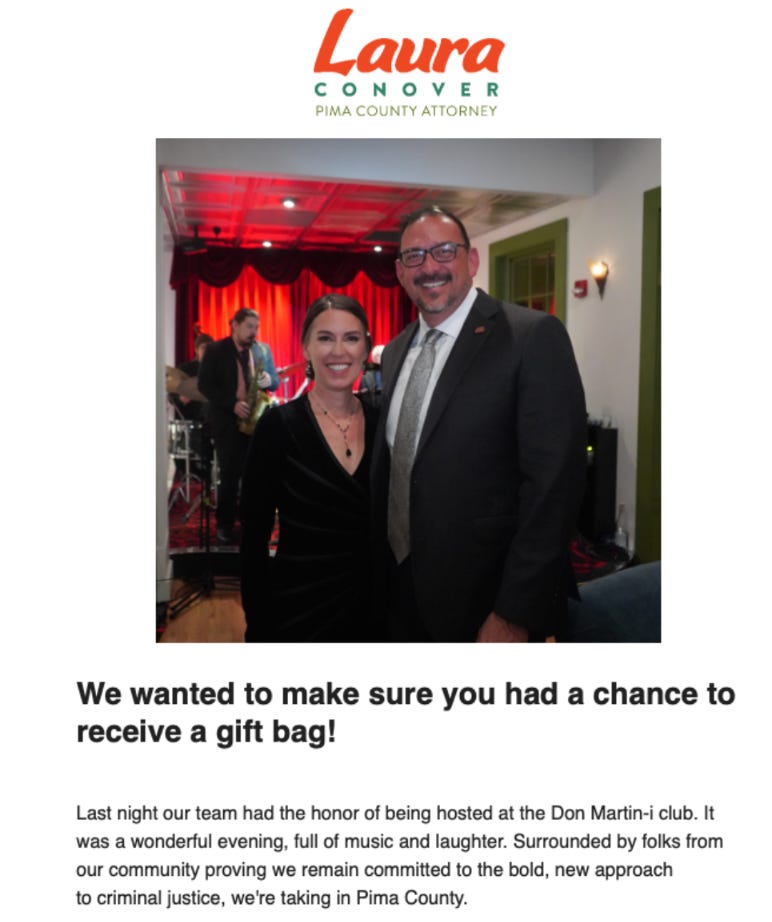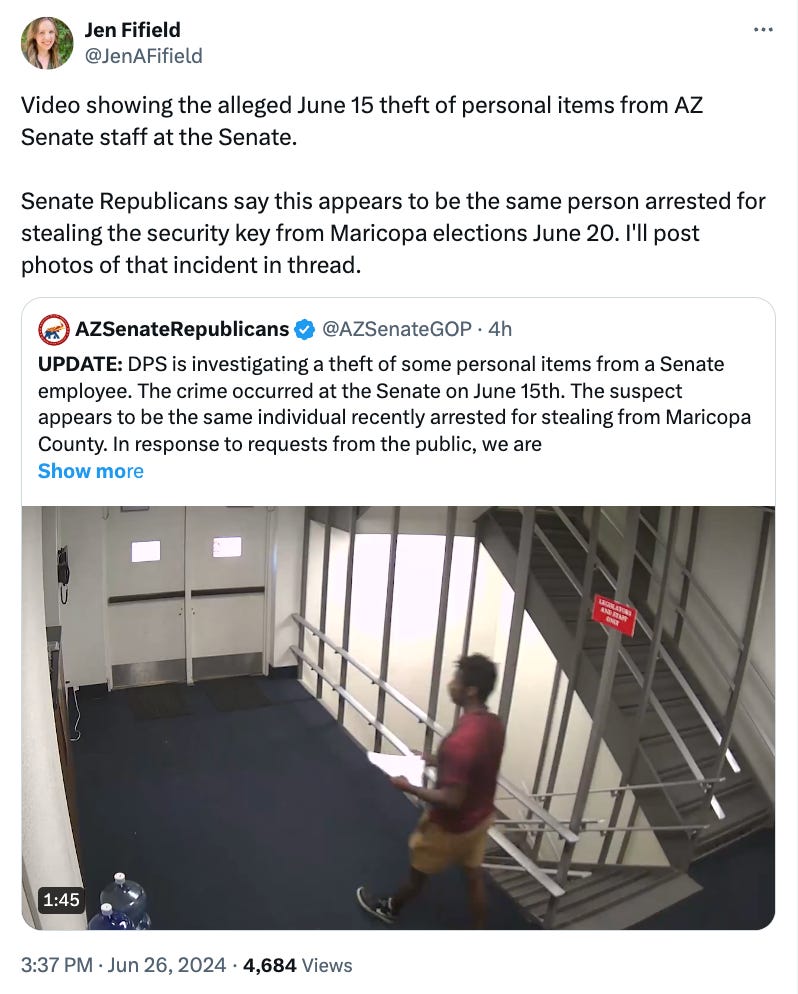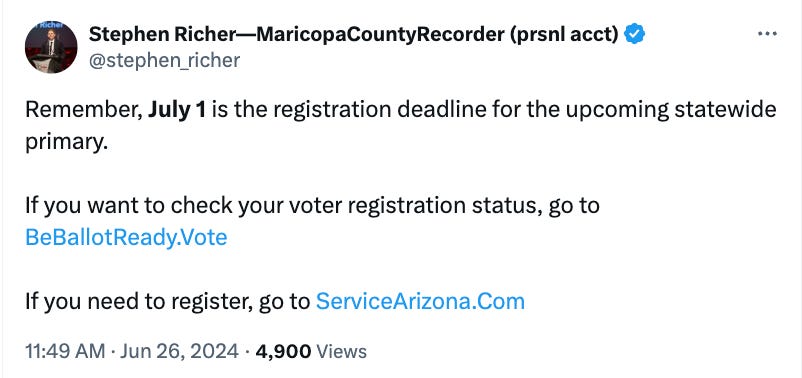Investigating the endorsements
This is why we can’t have nice investigations … Conflicts in the court, too … And they’re all losers and haters.
It’s campaign season, and politicians are touting their endorsements from other politicians, even if they’re under investigation by their endorsers.
Attorney General Kris Mayes has endorsed two Democratic candidates in this year’s election: Congressional District 1 hopeful Marlene Galán-Woods and Pima County Attorney Laura Conover, who both face fierce challenges within their party’s primary.
Woods and Conover also both face allegations of illegal campaign activity that Mayes has been asked to investigate.
The tangled tale of what happened to those two complaints illustrates exactly why politicians with oversight of elections shouldn’t endorse other politicians — and how little interest the state’s top law enforcement and elections officers seem to have in prosecuting their own.
Mayes’ office referred the Woods investigation, which deals with alleged petition signature fraud, to another prosecutor because of the clear conflict of interest that it represents, her office said.
But she only did it after we called to ask about the conflict. And only after it languished for more than a month in her office, uninvestigated. Her office said it was an oversight and they had intended to forward the complaint sooner.1
In the Conover case, which deals with allegedly illegal fundraisers, Mayes’ office didn’t get a formal referral from the Secretary of State’s Office, which is supposed to review the merits first, Mayes’ spokesman Richie Taylor explained. If the Secretary of State’s Office did advance the complaint, Mayes’ office would refer the investigation out to avoid the conflict.
But guess who else endorsed Conover in her reelection bid? Secretary of State Adrian Fontes. And Fontes attended one of the allegedly illegal fundraisers that allies of Conover’s opponent, Mike Jette, filed the complaint about.
Fontes didn’t forward the complaint for investigation because Conover is a county candidate, his office explained, noting it falls to the Pima County recorder to vet the complaint, and the Pima County attorney to potentially prosecute over it.
Meaning Conover would have to investigate herself or refer the complaint to another prosecutor.
That makes zero sense to Dave Smutzer, who filed the complaint. He was already worried that Mayes and Fontes couldn’t be impartial because of their endorsements.
“I would have no faith in submitting it to the county,” Smutzer told us.
Fontes’ office said it informed Smutzer to file the complaint with the county instead. But Smutzer says he never received that email.2
Smutzer said he even called Fontes’ office on Tuesday to check on the complaint because he was “getting suspicious” that nobody replied. The office told him to submit his question about the complaint’s status via email. The Secretary of State’s Office hasn’t replied to that email either, he said.
Mayes is going through her first election as an influential, sought-after name who can provide a stamp of approval for other Democratic candidates. But unlike a lot of other politicians, the state Attorney General actually has an important oversight role in elections.
To avoid those obvious conflicts of interest and to protect their offices against claims of selective prosecution or vote-rigging, many politicians in law enforcement and elections positions simply don’t endorse other candidates.
But it’s not a hard and fast rule.
When Katie Hobbs was Secretary of State, she refused to endorse other Democratic candidates, saying it would be a clear conflict of interest for her as an election official. Maricopa County Recorder Stephen Richer has taken the same approach.
Former Attorney General Mark Brnovich wasn’t as strict in saying no to politicians who wanted his endorsement, though he was careful to not endorse people he thought he might have to investigate, as one former campaign aide recalled.
“Brnovich was endorsement averse as AG because the ‘I might have to investigate you someday’ was a fitting excuse to not have to endorse,” as the former campaign worker put it.
The fact that politicians regulate the same politicians that they endorse goes a long way toward explaining why almost nobody is ever prosecuted in Arizona for campaign finance violations.
When Fontes was Maricopa County recorder, for example, his office had a policy of not even attempting to enforce campaign finance violations or collect the debt owed from those violations, as the Republic’s Sasha Hupka revealed this week.
County taxpayers lost out on more than $4.4 million in revenue from political scofflaws because of it.
Fontes said his office didn’t enforce the violations because his predecessor hadn’t done it, and blamed “the system” for not having a “mechanism to enforce the rules that exist.” That would be a lot more convincing if he had actually tried to enforce the rules and failed, or if he had proposed new rules that would better allow him to enforce existing laws.
Meanwhile, as the enforcement officers dither, the election is slipping away. Ballots for the primary election will start hitting mailboxes next week.
The complaint against Woods was sent to Mayes’ office more than a month ago. The complaint against Conover was filed with Fontes more than three weeks ago. Nobody has even started investigating either of them.
The election will be long over before we know if the complaints have any merit, assuming anyone ever gets around to investigating them at all.
The lackadaisical approach that Arizona’s top law enforcement and elections officers have taken toward investigating campaign law violations is a disservice to both the accusers and the accused candidates who have no chance to make their case before the election is over.
But most of all, it’s a disservice to voters, who have no way of knowing if the politicians who want to represent them are worthy of their vote — before they step into a polling booth.
Quite the conundrum: Maricopa County Superior Court Judge Randall Warner recused himself from deciding if a ballot measure that would grant judges lifetime appointments is legal, Capitol scribe Howie Fischer writes. Arizona judges are appointed by the governor and subject to regular retention elections, but the measure legislators referred to the ballot this November would take away voters' say and let judges keep their jobs until a mandatory retirement age of 70. Challengers are suing to take the measure off the ballot, arguing its title is misleading and it doesn’t follow the constitutionally mandated single-subject rule. But as Fischer puts it, the legal challenge begs the question: “Who could hear the case without having a personal stake in the outcome?”
The worst kind of list: A waitlist for families seeking childcare assistance could return as federal pandemic funds expire. The state Legislature filled a multimillion-dollar budget hole in last-minute budget negotiations, but Arizona’s child welfare agency still doesn’t have enough funding to make up the entire shortfall, Maria Polletta reports for the Arizona Center for Investigative Reporting. Bill Berk, the CEO of a preschool and child care center provider, said last time a wait list was in place, families called the Arizona Department of Child Safety on themselves in desperation for child care subsidies.
Another one bites the dust: Rep. Laura Terech will become the seventh Democrat to resign from the state Legislature this year after announcing she’s officially stepping down from her position effective this Sunday, the Arizona Capitol Times’ Jakob Thorington reports. Terech announced in March she’s not running for reelection, and Democratic precinct committeemen have three weeks to come up with potential replacements . Former state Rep. Kelli Butler and Madison Elementary School District Governing Board President Karen Gresham are on the Democratic ticket for LD4’s House seats next year, while current Rep. Matt Gress is running with Pamela Carter as the Republican team.
It pays to be an insider: First Solar, an Arizona-based company and the largest domestic maker of solar panels, spent $2.8 million lobbying the Biden administration and has now seen its stock prices and profits soar after receiving what could amount to billions in federal subsidies, per the Associated Press. A group of Democratic donors who invested in First Solar has seen massive windfalls, and the company’s set to earn billions in tax credits for domestic clean energy manufacturers.
We can’t give you stock tips, but we’re full of political tips we’ll continue to pass your way with the help of paid subscriptions.
The signs suck: A Phoenix subreddit thread seems to reflect the sentiment of most voters when it comes to the campaign signs crowding our street corners: They’re extremely annoying. But political consultants say they’re imperative to gain name recognition, Fernando Cervantes Jr. reports for the Republic. They’re also one of the most cost-effective ways to campaign, experts say.
“I get the need for them, people gotta get their name out,” one Mesa resident said. “It’s basically trash, I don't like any of the signs, I don't like the campaign signs, I don't like the ‘we will buy your house’ signs, I don't like any of that stuff.”
Several environmental groups will deliver a petition to Gov. Katie Hobbs at 10 a.m. today asking her to close down the Pinyon Plain uranium mine near the Grand Canyon and the Havasupai Tribe.
Civic Engagement Beyond Voting is hosting a Zoom webinar on the life of a ballot. You can register here.
And Mesa mayoral candidate Ryan David Winkle is having a potluck/meet and greet in Gilbert at 6 p.m., while Mesa City Council has a study session at 7:30 a.m.
You can check out our entire political calendar here. Add it to your own Google calendar here.
And send us events through this form, or email us at info@arizonaagenda.com. As long as it’s Arizona politics-related and has all the info, we’ll post it.
Arizona’s favorite political parody account, The Real Thelma Johnson, pointed out a new development in LD7 House candidate Steve Slaton’s ongoing battle against claims he didn’t really serve in the military. And by claims, we mean official discharge records that show he never saw combat in Vietnam. Slaton said someone stole his identity, which caused errors in the discharge papers.
The Navajo County Republican Committee is calling for him to drop out of the race over the stolen valor claims, and Slaton issued a response addressed to the “local Navajo County losers.”
He had at least one supporter in the comments, albeit from the Trump Merchandise store he owns.
The office provided a series of emails proving they did, indeed, intend to forward the complaint to the Maricopa County Attorney’s Office because of the conflict.
Fontes’ office did forward an email showing they responded. But Smutzer says he checked his spam box and everything.












"Slaton said someone stole his identity". Ahhh yes...the old "Stolen Identity" card. I wonder how his pathetic little store will be doing 10 years from now? There's a "Trump Store" just north of Tombstone as well. I pass by there all the time. I have never seen anybody parked there. Even in winter.
Appreciated the balanced article on the endorsements.